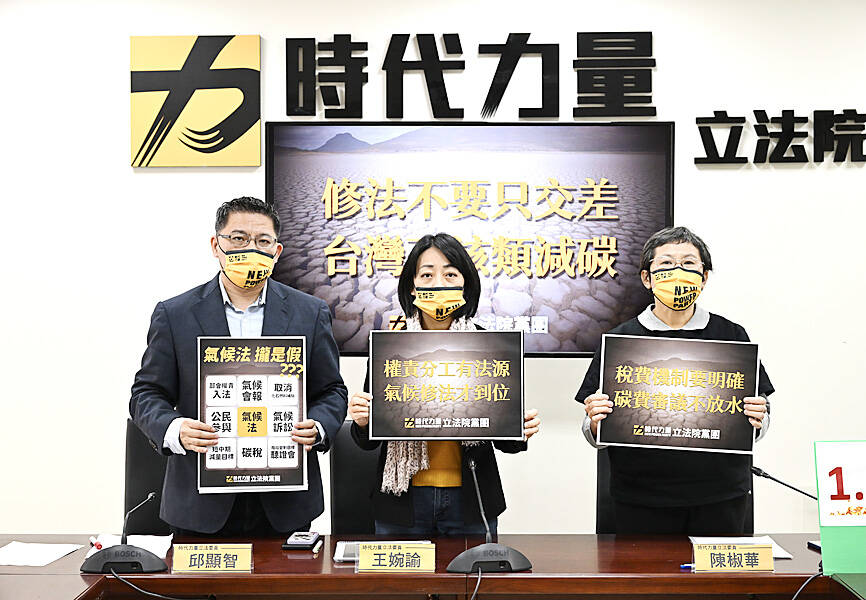The New Power Party (NPP) caucus yesterday questioned a proposed preferential carbon fee, saying that it might provide loopholes for large enterprises.
The Executive Yuan in April passed the Environmental Protection Administration’s (EPA) proposed amendments to the Greenhouse Gas Reduction and Management Act (溫室氣體減量及管理法) and renamed it the draft “climate change adaptation act.”
As no consensus has been reached on the draft, it awaits further negotiations by legislative caucuses.

Photo: Lo Pei-te, Taipei Times
NPP Legislator Claire Wang (王婉諭) told a news conference yesterday that the responsibilities and division of labor of each government agency should be clearly stated in the act, as cross-agency actions are needed to combat climate change.
Agencies tend to carry out cross-agency projects passively and even evade responsibilities, she said, adding that sometimes no agency is willing to undertake important affairs.
Under the draft, the National Council for Sustainable Development would be in charge of coordinating, distributing and integrating climate actions, she said.
However, the council is operating as a temporary task force, so it has limited ability to coordinate among agencies, she said.
The Executive Yuan should propose concrete measures to carry out an organizational transformation of the council before the draft undergoes cross-caucus negotiations, the caucus said.
NPP Legislator Chiu Hsien-chih (邱顯智) likened the draft to “a tiger without teeth.”
Lawmakers across parties have agreed to include a carbon reduction goal into the amended act, but the EPA refused to do so, he said.
The proposed draft authorizes the government to enact many important regulations, which is “completely inconsistent with the spirit of legislation” and “shows no respect for the legislature,” he said.
Regulations regarding climate litigation, an important tool for the public to seek relief, are included in the draft amendments proposed by civil groups and Democratic Progressive Party legislators, but not the Executive Yuan, he added.
The rate of carbon fees should be determined by a dedicated review committee, at least two-thirds of which should comprise experts and representatives of civil groups, NPP Chairwoman Chen Jiau-hua (陳椒華) said.
The management board of the Greenhouse Gas Management Fund should have the same composition, she added.
As for a potential corporate loophole, Article 29 in the Executive Yuan’s draft states that those who reach a specified greenhouse gas reduction goal may submit voluntary reduction plans to the central competent authority to apply for preferential rates for carbon fees, she said.
However, competent authorities might not be able to assess each company’s plan and provide preferential rates accordingly, Chen said, calling for the article’s removal from the draft.

Taiwan has received more than US$70 million in royalties as of the end of last year from developing the F-16V jet as countries worldwide purchase or upgrade to this popular model, government and military officials said on Saturday. Taiwan funded the development of the F-16V jet and ended up the sole investor as other countries withdrew from the program. Now the F-16V is increasingly popular and countries must pay Taiwan a percentage in royalties when they purchase new F-16V aircraft or upgrade older F-16 models. The next five years are expected to be the peak for these royalties, with Taiwan potentially earning

STAY IN YOUR LANE: As the US and Israel attack Iran, the ministry has warned China not to overstep by including Taiwanese citizens in its evacuation orders The Ministry of Foreign Affairs (MOFA) yesterday rebuked a statement by China’s embassy in Israel that it would evacuate Taiwanese holders of Chinese travel documents from Israel amid the latter’s escalating conflict with Iran. Tensions have risen across the Middle East in the wake of US and Israeli airstrikes on Iran beginning Saturday. China subsequently issued an evacuation notice for its citizens. In a news release, the Chinese embassy in Israel said holders of “Taiwan compatriot permits (台胞證)” issued to Taiwanese nationals by Chinese authorities for travel to China — could register for evacuation to Egypt. In Taipei, the ministry yesterday said Taiwan

‘LIKE-MINDED PARTNER’: Tako van Popta said it would be inappropriate to delay signing the deal with Taiwan because of China, adding he would promote the issue Canadian senators have stressed Taiwan’s importance for international trade and expressed enthusiasm for ensuring the Taiwan-Canada trade cooperation framework agreement is implemented this year. Representative to Canada Harry Tseng (曾厚仁) in an interview with the Central News Agency (CNA) said he was increasingly uneasy about Ottawa’s delays in signing the agreement, especially as Ottawa has warmed toward Beijing. There are “no negotiations left. Not only [is it] initialed, we have three versions of the text ready: English, French and Mandarin,” Tseng said. “That tells you how close we are to the final signature.” Tseng said that he hoped Canadian Prime Minister Mark Carney

POSITIVE DEVELOPMENT: Japan and the US are expected to hold in-depth discussions on Taiwan-related issues during the meeting next month, Japanese sources said The holding of a Japan-US leaders’ meeting ahead of US President Donald Trump’s visit to China is positive news for Taiwan, former Japan-Taiwan Exchange Association representative Hiroyasu Izumi said yesterday. After the Liberal Democratic Party’s landslide victory in Japan’s House of Representatives election, Japanese Prime Minister Sanae Takaichi is scheduled to visit the US next month, where she is to meet with Trump ahead of the US president’s planned visit to China from March 31 to April 2 for a meeting with Chinese President Xi Jinping (習近平). Japan and the US are expected to hold in-depth discussions on Taiwan-related issues during the